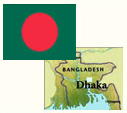
While the High Court (HC) division of Bangladesh Supreme Court (SC) was declaring the election of local government as valid, Indian conglomerate TATA was informing the Board of Investment (BoI) that they are withdrawing their 3 billion dollar investment proposal as Bangladesh is not able to commit gas supply requirement to the proposed Investment. These very happenings are important to the politics and investment scenario of Bangladesh.
For a long time, the local government of Bangladesh was in non-political nature. Under the British rule, the local administrative representation was mainly from the feudal lords. In the post-1947 era, when Bangladesh was under a semi-colonial rule of Pakistan, local bodies were full of military autocrats and after 1971, the independence of Bangladesh, the country had a local government system that was non-political in nature. Here the character of local government was largely inclined towards military autocrats, who ruled up to 1990.
In post-1990, democratically elected political government came in to the process of governance but the local authority remains the same, though the urge and expectation of people were different who want to see the local government representatives with political identity. Reflection of people’s aspiration was first seen in the local government elections during the political governance of Bangladesh Awami League (AL) and Bangladesh Nationalist Party (BNP).
During the post-1990 politics, local governments were controlled by the general secretary of the party in power as it is a custom in Bangladesh that the general secretary of ruling party would be the Minister for Local Government & Rural Development (LGRD). It was the intention of the political parties that through this practice Local Bodies might be controlled to favour the party in power.
Subsequently, a positive change came out from the practice to the people’s psychology that as the local representatives are controlled by the political party the representatives should be opened about their political identity, affiliation and portfolio. As of the influence of the people’s aspiration, the election for the last City Corporation was held in the colour of political identity. In Union Council, the grass-root local body election, voters were also grouped as per the party line as the candidate was loosely supervised by the political parties.
After January 11, 2007, when the military backed interim government came into power, many reforms started including the local government. In course of the reform process, Election Commission (EC) of Bangladesh has made some changes in local government election on the basis of legal support, came out from government ordinances. With the changes, it was told that local government election must be non-political in character. Candidates must not have any political affiliation or attachments. A writ petition was filed in the HC challenging the validity of the said measure of EC.
In response to the writ petition, the HC observed in the judgment that since the functions and activities of the political parties are acknowledged in the constitution, the electoral rules restricting the use of political parties' affiliation in the city corporation and municipality polls are illegal.
As per Article 152 of the constitution, political parties can run activities within and outside the parliament. In the Local Government (City Corporation) Ordinance 2008 and the Local Government (Municipality) Ordinance 2008, there are no rules of de-politicisation. The rules in the Electoral Code of Conduct issued by the Election Commission restricting the use of political affiliation are also violation of the mother ordinances, the court observed.
The government on May 14 issued gazette notifications promulgating the two ordinances for holding the elections. The EC issued the Code of Conduct in light of the ordinances. On June 20, it announced the poll schedule for 4 City Corporations and 9 municipalities. However EC said that the constitutional body will abide by the HC order. As a result the local government election process of Bangladesh gets legal support to be political in nature.
Tata scraps $3bn investment plan
Meanwhile Indian corporation TATA steps back from a 3 billion dollar investment proposal as the TATA management sees it as ‘no prospect’ one. TATA management said in a statement, it is clear that the government will not be in a position, in the foreseeable future, to grant the projects the natural gas commitment they would require. Consequently there is no prospect of taking these projects further. The decision of TATA may be a simple thing for the Company, but it is the alarming reflection of Natural Gas Management and Investment scenario of Bangladesh.
Whichever the Company is, every one would like to hear the music of Investment opportunities in Bangladesh those include Energy & Power supply, security of investment in terms of business and law & order, efficiency of government offices to obtain legal status, time boundary in approval process of government and of course the behavioural pattern of officials concern. It must be mentioned that the TATA deal could be an example for the policy makers of Bangladesh when they will go for FDI further.
|
|
Read More: Bangalore Rural


Comments: